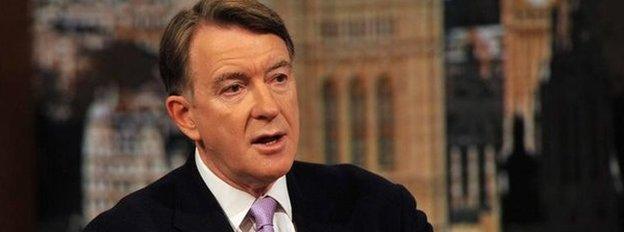Mandelson cautions Labour on pre-poll tuition fee move
- Published

Labour's former Business Secretary Peter Mandelson has said the party should wait until after the general election before making a commitment to a new tuition fees policy.
The party is believed to be considering a pledge to cut fees from £9,000 to £6,000 in England if it wins power.
Lord Mandelson said the door should be left "slightly ajar" until after May 7.
BBC Political Editor Nick Robinson said Labour had yet to work out how to pay for the pledge.
In 2011 Labour leader Ed Miliband signalled his intention to cut fees in England, which were trebled under the coalition government. The party said it was being "very careful" and would announce plans "very shortly".
Lord Mandelson, who was previously the minister responsible for higher education, told the BBC there was "no evidence" that the increase in tuition fees under the coalition had "dented" university access.
"This is exactly the sort of thing that any party will want to look into in greater detail and the best place to do that is in government," he said.
"Whatever the direction of travel, I would say, 'Let's leave the door slightly ajar to take a final decision when in government.' "

Analysis by BBC Political Correspondent Iain Watson

Lord Mandelson wants reassurances on university funding
Peter Mandelson is the most recent Labour cabinet minister to have had to wrestle with the controversial policy of student fees in government.
He told me today he did not want to go "head-to-head" with the current party leadership.
But he thinks that with no political clamour to bring fees down in England, it may have been better for Labour to tackle the "complex" issue of student finance after the election.
He recognises that any cut in tuition fees announced before the election would raise searching questions about how it would be funded.
The quest to find answers has been responsible for the time it has taken for Labour to announce its final policy.
One option is to reduce fees for some, not all, courses - the so-called Stem subjects of science, technology, engineering and mathematics.
Lord Mandelson wants reassurance that Labour would not be tempted to pay for this fee-cutting policy by reducing funds to universities.
But he - in common with some shadow cabinet members, privately - has wider concerns.
If Labour can find cash to reduce fees, could that money be used in a better way, such as by easing the costs that students face at university?
But party sources say the current system costs the taxpayer more money than the previous one, and needs to change.

Earlier, in a speech to a private meeting of university vice-chancellors, he said any cut in university tuition fees would have to be offset by increases in higher education funding from other sources.
Cutting back overall funding for higher education would be "a false economy", he added.
He said none of the main parties would expand state funding for universities, adding that institutions would meet funding shortfalls by cutting courses, facilities and support for poorer students, or by giving overseas students preference over British ones.
"Participation levels have risen from every level of British society, including the most disadvantaged. Higher fee levels have not undermined this," he added.
The Liberal Democrat Business Secretary Vince Cable criticised Labour's mooted fees cut as a "populist gesture", and warned that it would "achieve nothing and do a lot of damage".
Mr Cable told BBC Radio 4's Today programme that the policy would lead to shortfalls in university funding, and could result in courses being cut.
But Chris Leslie, Labour's shadow chief secretary to the Treasury, criticised the Lib Dems over their previous pledge - made before entering government - to abolish fees.
"We are being careful about this," he said.
"We are not doing a Nick Clegg. We are going to make sure we can actually fund promises we make. We are working through the detail and we will announce our solution on tuition fees very shortly."
- Published20 February 2015

- Published20 February 2015
- Published2 February 2015

- Published25 September 2011

- Published30 January 2015

- Published25 January 2015